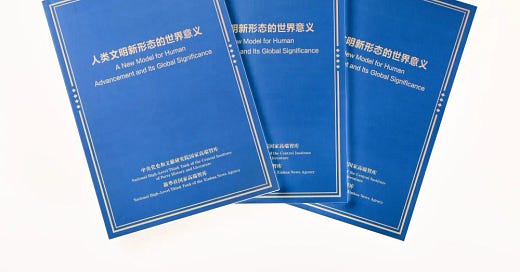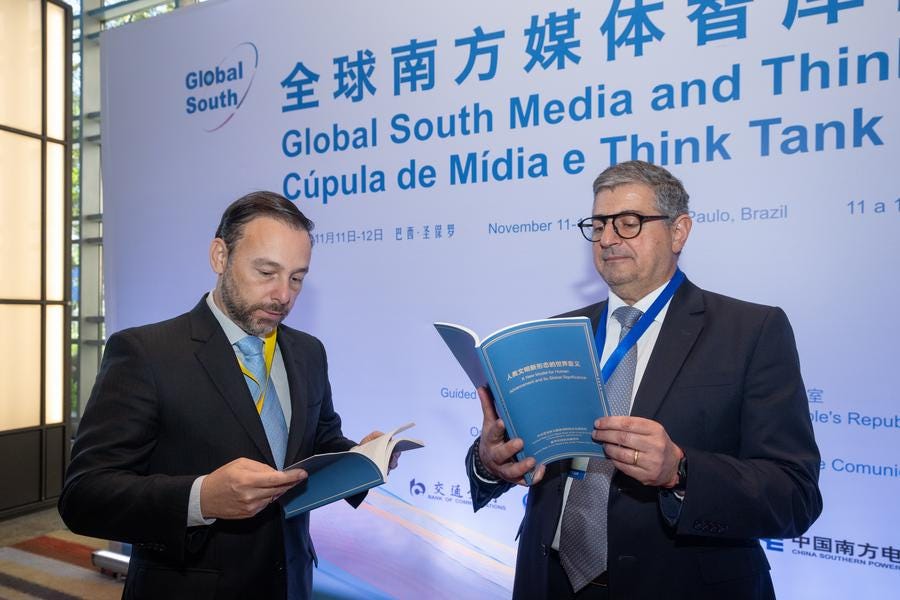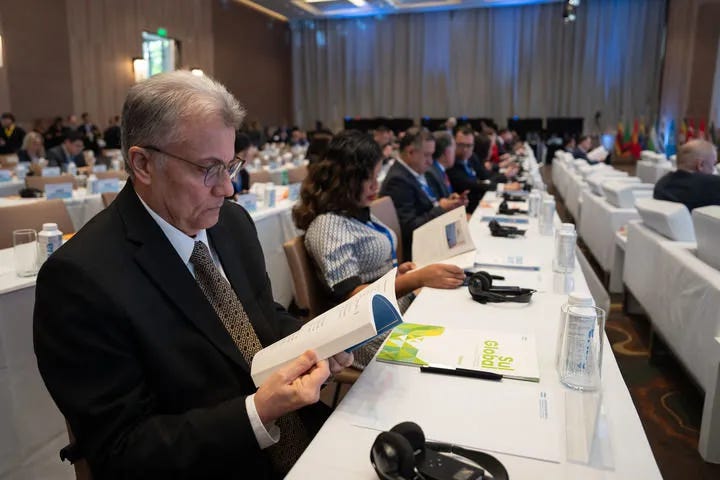A New Model for Human Advancement and Its Global Significance (Part 5)
Chapter 3 - Where Is Humanity Headed: Chinese Insights into the New Model for Human Advancement (Section 3 to 4)
In today’s piece, we are updating you on the Chapter 3, Section 3 to 4, the last two sections of the final chapter of our report, “A New Model for Human Advancement and Its Global Significance,” launched on November 11, at the Global South Media and Think Tank Forum in Sao Paulo, Brazil. We look forward to answering any questions you may have so be sure to drop a like, comment, and subscribe for more!
Chinese modernization is deeply rooted in the fine traditional Chinese culture, mirrors the advantages of scientific socialism, draws inspiration from all of human civilization's outstanding achievements, represents the direction of the progress of human civilization, and demonstrates a new vision that's different from Western modernization. It is a new model for human advancement.
——Xi Jinping
3. An Enriched Vision of Human Civilization
"A single flower does not make spring while one hundred flowers in full blossom bring spring to the garden." Human civilization features diversity and its essence lies in its richness and multifaceted nature. The new model for human advancement forged by Chinese modernization takes its root in China's fine traditional culture, draws inspiration from all of human civilization's outstanding achievements, and will thereby nurture the garden of world civilization and create a new prospect for its development.
3.1 Carrying forward China's Fine Traditional Culture
In parallel with the other three recognized oldest civilizations in history—Ancient Egypt, Mesopotamia, and the Indus Valley, Chinese civilization stands out as the only one to have endured uninterrupted for over 5,000 years, continuing to thrive to this day and featuring brilliant material, and cultural- ethical progress.
The British philosopher Bertrand Russell pointed out, "Since the days of Confucius, the Egyptian, Babylonian, Persian, Macedonian, and Roman empires have perished; but China has persisted through a continuous evolution."
The British historian Arnold J. Toynbee once put the hope of the future in the East and predicted that China would lead the world with its distinctive civilization. "If there were no 5,000-year Chinese civilization, how could we build anything with what we describe today as Chinese characteristics?"
The ceaselessly self-generated, extensive, and profound fine traditional Chinese culture is "a great strength of the Chinese nation" and "the origin and soul of the Chinese nation," reflecting the spiritual endeavors, rational thought, and cultural achievements developed through a long history of struggle and embodying the aspiration of the Chinese people.
The values at the core of China's fine traditional culture—self-cultivation, family regulation, state governance, and bringing peace to all under heaven; respecting the times and upholding one's position; mastering both permanence and change; understanding things and succeeding in one's endeavors; and achieving success and establishing lasting contributions—have evolved into the essential cultural DNA of the Chinese nation, serving as guiding philosophies of governance and ways of life for the Chinese people, both individually and nationally, and forming a unique cultural identity that distinguishes the Chinese from other nations.
China's fine traditional culture espouses many important principles and concepts with indigenous features, including pursuing common good for all, regarding the people as the foundation of the state, governing by virtue, discarding the outdated in favor of the new, acting in good faith and being friendly to others, and fostering neighborliness. These maxims reflect the Chinese people's way of viewing the universe, the world, and morality, which have nurtured a profound historical foundation for a new model for human advancement and provided valuable insights for the international community as it navigates changes in the world, the times, and the history.
3.2 Drawing Inspiration from Human Civilization Achievements
The richness and depth of Chinese culture stem from its openness and inclusiveness. Formed by diverse cultures coming together, Chinese civilization has thrived on the land of China through continuous exchanges and mutual learning with other civilizations.
Chinese culture advocates for resolving conflicts and building consensus, resulting in its diverse yet unified and continuous nature. Throughout the long course of history, Chinese civilization has maintained an open-minded approach and absorbed the essence of foreign cultures, thereby creating a distinctive cultural identity for the Chinese nation. The 5,000-year history of Chinese civilization stands as the best testament to the enduring nature of culture through exchanges and mutual learning. The CPC, in its pursuit of national independence, people's liberation, national prosperity and strength, people's well-being, world peace, and international cooperation, has always drawn inspiration from all of human civilizations' outstanding achievements.
Today, Chinese communists, with a global vision and an inclusive spirit, gather wisdom and strength from China's fine traditional culture while breaking down cultural barriers to absorb valuable elements from other civilizations, and with confidence and openness, they seek to share Chinese culture globally and add new luster to Chinese culture.
3.3 Nurturing the Garden of World Civilization
Anything which is successful in one country is of significance to the world. It must show the way to the people in modern times. With a history stretching back more than 5,000 years, the Chinese nation has fostered a splendid civilization and made indelible contributions to human advancement.
Since its introduction to China, Marxism has resonated and integrated with China's fine traditional culture, and scientific socialism has then gone on to take root on the land of China and delivered impressive results. Chinese communists have committed to integrating the basic tenets of Marxism with China's specific realities and fine traditional culture. By aligning with the new conditions of the era and the new requirements of practice, they have deepened their understanding of the historical trends of the world and the laws that underlie the development of human society and promoted the creative transformation and development of China's fine traditional culture. In this way, they have disseminated the most fundamental Chinese culture in a popular way to attract more people to participate in it, matching modern culture and society.
Through the exploration of Chinese modernization, a new model for human advancement has been created. Just as delicious soup is made by combining different ingredients, the beauty of harmony lies in the embrace of diversity. Diversity is the defining feature of human society and a crucial driving force for the advancement of civilization; diversity of human civilization drives progress of humankind and serves as a basic requirement for global cultural prosperity. Different histories, national conditions, ethnic groups, and customs give birth to diverse civilizations and make the world a colorful one.The interplay, mutual learning, diversity, and harmony among civilizations have created the greatest synergy for building a better world, supporting the development of world civilization towards balance, progress, and goodness, and making the garden of world civilizations more vibrant.
Chinese modernization has given rise to a new model for human advancement that exemplifies preserving national characteristics while developing culture, significantly influencing the evolution of world civilization. "We should popularize our cultural spirit across countries as well as across time and space, with contemporary values and the eternal charm of Chinese culture. We should tell the rest of the world about the new achievements of modern Chinese culture, which feature both excellent tradition and modern spirit, both national and international." The intellectual and cultural essence of the new model for human advancement is brilliant, which adds dazzling colors to the diverse civilizations of our time.The great rejuvenation of the Chinese nation will surely lead to a revival of Chinese civilization which will thereby transform the landscape of global civilization.
4. Building a Global Community of Shared Future
"To a crazy ship, all winds are contrary." In the vast ocean of human advancement, where is humanity's ship headed? Towards peace or war, development or decline, openness or closure, cooperation or confrontation? As we navigate this long journey, the "compass" of human advancement has already pointed clearly to the direction of a global community of shared future.
4.1 Creating an Even Better World
In response to the pressing question at the call of the times— "Where is humanity headed?"— Chinese President Xi Jinping proposed the concept of building a global community of shared future and the Belt and Road Initiative in 2013, and since then, he has elaborated the right direction of building a global community of shared future in various international occasions, systematically explaining the scientific essence of this concept.
Directly addressing the most significant issues facing the world today, the concept of building a global community of shared future has put forth clear positions on international relations, global governance, and cultural exchanges, responding to the universal aspirations of people for peace, development, and cooperation, while demonstrating powerful influence, vitality, and appeal.
Riding the tide of history, we are pursuing the right way forward to an even brighter future. In January 2017, President Xi Jinping answered the question—What has happened to the world and how should we respond? —raised by the world and by the times during a speech at the United Nations Office at Geneva. He emphasized, "Pass on the torch of peace from generation to generation, sustain development and make civilization flourish: this is what people of all countries long for; it is also the responsibility statesmen of our generation ought to shoulder. And China's proposition is: build a global community of shared future and achieve shared and win-win development."
Over the past decade since the 18th CPC National Congress in 2012, the Party has transformed the concept of building a global community of shared future into concrete achievements through practical cooperation across various fields with numerous countries and regions. President Xi Jinping proposed significant initiatives within the framework of the Shanghai Cooperation Organization (SCO) to establish "a community of health for us all", "a community of security for us all", "a community of development for us all", and "a community of cultural exchanges for us all".
Additionally, within the Asia- Pacific Economic Cooperation (APEC) framework, he called for building an "Asia- Pacific community of shared future" featuring openness, inclusiveness, innovation-driven growth, greater connectivity, and mutually beneficial cooperation. He also put forth important initiatives for "a community of shared future in cyberspace", "a community of shared future on nuclear security", "a maritime community of shared future", and "a global community of health for all" on various occasions. By focusing on international and regional interactions, initiatives like "a China-Africa community of shared future", "a China-Latin America community of shared future", "a China-Vietnam community of shared future", "a China-Laos community of shared future", and "a China-Pakistan community of shared future" have further clarified the meaning and specifics of building a global community of shared future.
The commitment to building a community of shared future, a vital strategy for upholding and developing socialism with Chinese characteristics in the new era, has become a prominent banner for China to lead the direction of human advancement. As the beacon of the new model for human advancement shines ever brighter in the ocean of civilization, it is essential to promote the building of a global community of shared future that advocates for the peaceful coexistence and harmonious symbiosis of civilizations, and a world of lasting peace; to encourage the joint development and win-win cooperation among civilizations for a world of universal security; to establish a solid material foundation for civilization continuity and common prosperity; to enrich and advance political progress for an open and inclusive world; and to participate in, contribute to, and lead global ecological civilization efforts for a clean and beautiful world. Only by doing so can we ensure the correct path forward.
4.2 Upholding Common Values of Humanity
Humanity's shared values of peace, development, fairness, justice, democracy, and freedom have become a powerful source of inner strength that drives human advancement in the right direction. "A mere property career is not the final destiny of mankind, if progress is to be the law of the future as it has been of the past... Democracy in government, brotherhood in society, equality in rights and privileges, and universal education, foreshadow the next higher plane of society to which experience, intelligence and knowledge are steadily tending. It will be a revival, in a higher form, of the liberty, equality and fraternity of the ancient gentes."
The world is undergoing change on a scale unseen in a century. To solve outstanding contradictions and problems facing the humankind, it is necessary to rely on material means to overcome difficulties and on the strength of the spirit to rectify mind through thinking with sincerity. Chinese President Xi Jinping put forward for the first time humanity's shared values when he attended and addressed the General Debate of the 70th Session of the United Nations General Assembly in 2015. After that, he has elaborated on the implications of humanity's shared values on different occasions both within China and abroad. China sincerely calls upon all countries to hold dear humanity's shared values of peace, development, fairness, justice, democracy, and freedom; to promote mutual understanding and forge closer bonds with other peoples; to respect the diversity of civilizations; to allow cultural exchanges to transcend estrangement, mutual learning to transcend clashes, and coexistence to transcend feelings of superiority; and to join forces to meet all types of global challenges.
Martin Jacques, a British scholar, stated that humanity's shared values transcend the limitations of confrontational thinking, thus demonstrating an unprecedented appeal, and that only by upholding these shared values, fostering harmonious coexistence, and engaging in dialogue and consultation, can we overcome various global challenges and create an even better future for humanity. Peace and development are the common cause, fairness and justice, the common aspiration, and democracy and freedom, the common pursuit for all countries. The new model for human advancement actively champions humanity's shared values, transcending differences in ideology, social systems, and levels of development. It establishes the broadest common ground of values embraced by people across the globe and extends the unique value aspirations of the Chinese nation into a worldwide context.
4.3 Realizing Full and Free Development of Every Individual
"A society in which the full and free development of every individual forms the ruling principle" is undoubtedly a beautiful and aspirational vision. Since modern times, the dominant model for human advancement has been Western civilization, which adheres to the logic that "a rising power will inevitably seek hegemony". Such a model is based on the hegemonic power of a single country or the "balance of terror" among multiple nations, and its value system is exclusive, singular, and monopolistic, which limits the development of most developing countries and turns the full and free development of every individual into an illusion.
Former Guyanese President Donald Ramotar pointed out that "the imperialist countries' main objective in the developing countries is to keep them dependent and poor. In this way their resources can be easily exploited. The whole intention is to keep those countries as a source of raw materials and cheap labor. In other words, the imperialist states keep the countries in the Global South poor and powerless and easy to exploit in order to enrich themselves."
The transition of human civilization to a higher level involves developing from a lower form of "personal independence founded on objective dependence" to a higher form of "full and free development of every individual". The new model for human advancement created through Chinese modernization allows putting people first to transcend supremacy of capital, common prosperity to transcend polarization, the full and free development of every individual to transcend materialistic expansion, and equality and mutual progress among all countries to transcend hegemonism. This vision outlines a bright future and provides a practical path for achieving humanity's aspiration for a better life and the full and free development of every individual.
As Ramotar pointed out through comparison, China has adopted a totally different approach to its relations with the developing world. "China wants to allow the developing countries to move to a higher stage of value-added production where they can become prosperous. This idea is based on the conviction that when the countries of the Global South become more productive and increase their wealth, trade relations will become more robust, and all countries would become much better off," he said.
The laws governing human civilization teach us that the new model for human advancement, established through Chinese modernization, follows the general trend of human progress. Not only does it effectively capture the common aspirations of the people but provides a profound understanding of the principles of economic and social development. Standing firmly on the right side of history, this model represents a significant achievement that adheres to the laws of human advancement and keeps with the trend of the times, thus being the real right way towards a brighter future for all humankind.







This is a very good model, far superior to the Western “rules based order”. Rules are important, but development is even more important. Rules must facilitate development.